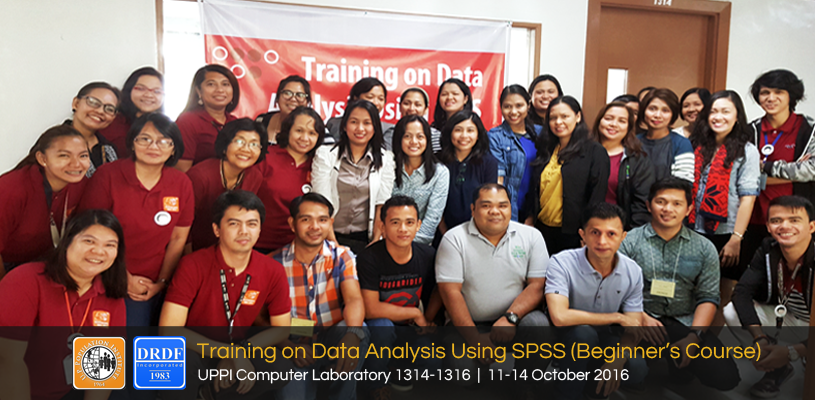Training
UPPI & DRDF Conduct July 2019 SPSS Training
Demographic Research and Development Foundation, in collaboration with the The UP Population Institute, will be conducting a Training on Data Analysis using SPSS on July 30 to August 2, 2019 fo for a maximum of 15 individual registrants.
Said training is designed to provide an intensive introduction to the latest version of the Statistical Package for the Social Sciences (SPSS), now known as IBM SPSS Statistics. SPSS is a user-friendly Windows-based statistical software and a powerful and versatile tool for data analysis. The training combines lecture and hands-on laboratory sessions and involves an analysis of a subset of a large dataset.
Recommended for faculty members, graduate students, business analysts and other researchers who want to enhance their data analysis capability, it also targets those with limited statistical background and for those needing an appropriate refresher in statistical analysis.
To be qualified for the training, participants need basic knowledge of statistical concepts and capability in computer operations with MS Windows. While experience with SPSS is not necessary, a basic understanding of the purpose and functions of the software would be advantageous.
The training will cover an overview of SPSS, univariate analysis and graphical presentation, data management, bivariate analysis, and linear regression.
Trainers are UPPI faculty members with extensive experience both in teaching SPSS and in survey data processing and analysis using SPSS. Faculty members from other UP units may also be invited as resource persons. Facilitators or laboratory assistants are available to assist the participants during the hands-on sessions.
Training venue is at the Computer Laboratory II at PH 1314-1316. Sessions begin at 9 am and end at 5 pm.
For registration, reservation, payment terms/instructions, or inquiries, contact trainings@drdf.org.ph. Please click this link to register: SPSS Training Online Registration.

- Training on Data Analysis using SPSS (Beginner's Course)
The course provides an intensive introduction to the Statistical Package for the Social Sciences (SPSS), now known as IBM SPSS Statistics. SPSS is a user-friendly statistical software and a powerful and versatile tool for data analysis.
The course will utilize a survey dataset to cover the following topics: preparation of data for analysis, variable transformation, data manipulation, generation of frequency distributions, summary statistics, crosstabulations and statistical graphs. The course will also provide an introduction to multivariate analysis.
Requirement: Must have knowledge of basic statistical concepts and have experience in computer operations using MS Windows
- Training on Advanced Statistical Analysis
The course will cover the following advanced statistical techniques in quantitative data analysis: Binary and Multinomial Logistic Regression, Multiple Classification Analysis (MCA), Multivariate Analysis of Variance (MANOVA), Factor Analysis, Item Analysis and Reliability Analysis.
The course will tackle situations when each method may be applied, the assumptions needed, how to set up the analysis using statistical packages, and how to interpret the results. Data manipulation techniques such as handling of multiple response variables will also be discussed. SPSS will be used as the primary statistical software in addition to STATA and MS Excel.
Requirement: Must have understanding of basic statistical concepts and basic SPSS background
- Course on Survey Research Methods and Data Processing
This course covers topics such as research design, survey methods, data processing, and data analysis. Training can be customized to fit the needs of the participants.
- Information Technology (IT) in Demographic Data Appreciation for LGUs
Training of municipal development officers or local executives and their technical assistants about demographic data appreciation at the LGUs; covering basic demographic concepts and measures.
